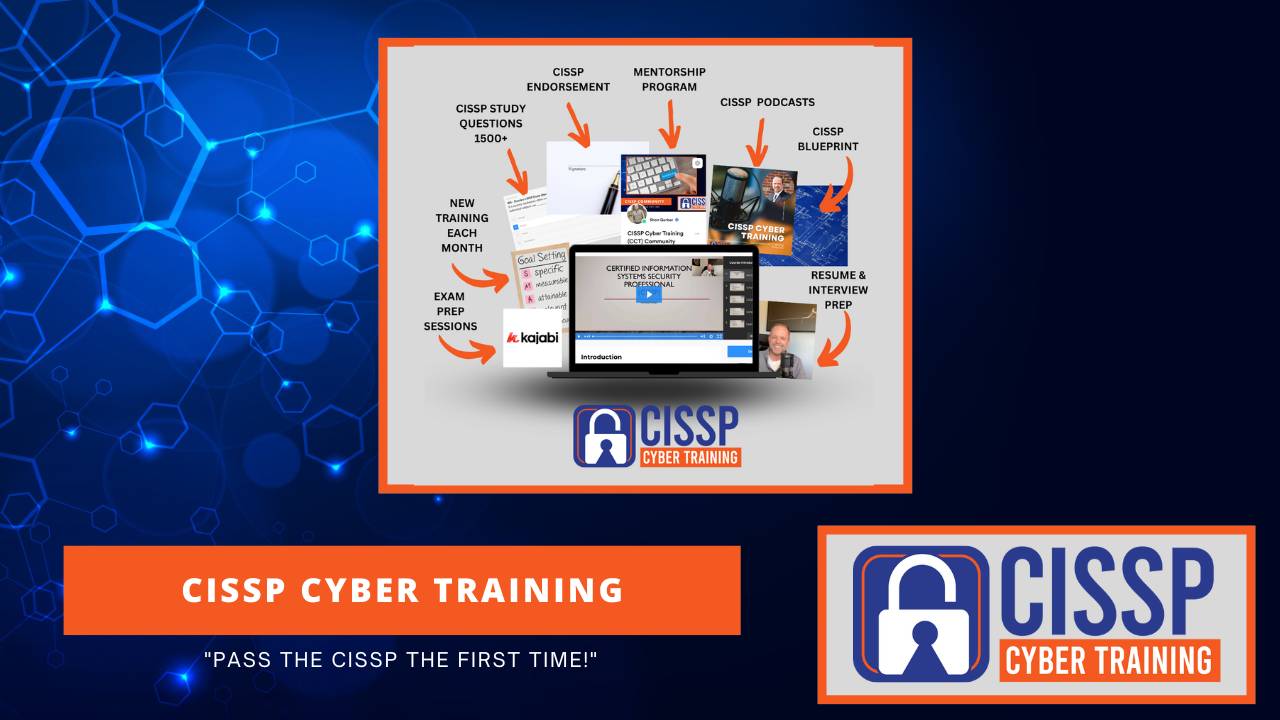CCT 117: CISSP Practice Questions - Navigating the CISSP Incident Management Maze (D7)
Feb 22, 2024Unlock the secrets to expert incident response with me, Sean Gerber, in this week’s CISSP Cyber Training Podcast. We're crunching down on the essential steps to effectively detect, respond to, mitigate, and recover from cybersecurity incidents. If you're serious about acing the CISSP exam and expanding your cybersecurity acumen, this episode is your study hall. We'll sift through real-world scenarios, dissecting the types of technologies that keep a vigilant eye on your network's pulse.
This isn’t just another lecture; it's a hands-on guide brimming with the kind of quiz-style interaction that sharpens your reflexes for test day and beyond. No guest, just you and me, tackling the questions that can make or break your understanding of incident management. From identifying false alarms to responding to genuine threats, this episode isn’t about pointing fingers—it's about empowering you with the know-how to keep your organization running smoothly. So, gear up for an insightful ride through the landscape of cybersecurity incidents and emerge more prepared than ever for the challenges of the digital world.
Gain access to 30 FREE CISSP Exam Questions each and every month by going to FreeCISSPQuestions.com and sign-up to join the team for Free.
TRANSCRIPT
Welcome to the CISSP Cyber Training Podcast, where we provide you the training and tools you need to pass the CISSP exam the first time. Hi, my name is Sean Gerber and I'm your host for this action-packed, informative podcast. Join me each week as I provide the information you need to pass the CISSP exam and grow your cybersecurity knowledge. All right, let's get started. Hey y'all, sean Gerber, with CISSP Cyber Training and today is, wonderfully, it is CISSP Question Thursday. Yes, we're going to be talking about CISSP Questions as it relates to the last episode that you had on Monday, which was 7.6.1. We're talking about incident response processes and this is going to be covering many of those aspects that we had from the CISSP. So the goal of this podcast is this episode is to talk about the questions themselves and then kind of go through some answers for you to get an understanding of what may be asked of you for the CISSP exam. Again, I wanted to put out the disclaimer these are not the CISSP Questions that you will see exactly on the test. They are designed to give you the understanding of what is. How should you respond to this test. That's what's great about the CISSP certification is that it isn't just taking a test and passing the cert, you actually have to understand the content and the thought process behind it so that you can, one, be a better security professional, but two, so that you can pass the cert. Now again, the Stronger Row CISSP Cyber Training. You can head out to CISSP Cyber Training anytime and get some great stuff. I've got awesome stuff out there for you that you can use. Got a special going on this month that you can go check out. It's amazing and again make it available for you until the end of April. So it's a very good thing, all right. Question one which of the following best describes the purpose of an incident management in cybersecurity? So which of the following best describes the purpose of incident management in cybersecurity? A to prevent all security incidents from occurring. B to detect, respond, mitigate and recover from security incidents effectively. C to ignore security incidents until they become critical. Or. D to blame individuals responsible for the security incident. So which of the following best describes the purpose of incident management in cybersecurity? And the answer is B to detect, respond, mitigate and recover from a security event effectively. That's the ultimate goal is to create processes and procedures to do this for an organization. You want them to be able to detect it, respond, mitigate and recover in a way that helps the company continue operating in a way that is effective for their organization. So it's again, you don't want to blame people. I mean, it probably was Bill's fault for clicking on that link, but we don't want to blame Bill. We want to resolve the issue and address the problem. Question two which technology is commonly used for real-time monitoring and analysis of security events and alerts? So what technology is commonly used for real-time monitoring and analysis of security events and alerts? A intrusion detection systems. B firewalls. C antivirus software or D virtual private networks? Again, which technology is used for real-time monitoring and analysis of security events and alerts? And the answer is A intrusion detection systems, intrusion detection or also intrusion prevention systems. They are used for real-time monitoring and analysis of security events and the alerts that are associated with them. And now the key on that, though, is they go into a place where you can actually monitor them. If they're doing it and nobody's looking at them, it doesn't really help you a whole lot. So you want to have the ability to monitor those systems. Question three which of the following is not a type of security incident that can be detected? A unauthorized access attempts. B malware infections, c data breaches or D software updates. Okay, which of the following is not a type of security incident that can be detected? A unauthorized access attempts. B malware infections. C data breaches or D software updates. So which is not a type of security incident that would be a software update? These are not typically considered a security incident, right, they're rather a routine maintenance. But the other three were security incidents. So one thing is, you wanna read through that question too fast and go oh okay, I'll pick on something real quick. Now these are all made sense, right, that why you wouldn't do that. But you wanna read the questions. You wanna take your time. You have about a minute for each question, so you have plenty of time to read the question and then make a proper response. Question four what is the immediate priority upon detecting a security incident? A notify the media. B activate the incident response team. C ignore the incident, continue on normal operations. Or D delete all logs and cover up the incident? Probably D. If you are the bad person that did it, maybe you might do that, but that even then you should not do that. That's a bad idea. So what is the immediate priority? The immediate priority is B activate the incident response team or process. You wanna ensure that that's enabled. One. You need to have one and two. You need to test it, but you need to activate it once something happens to ensure that proper notification is occurring both internally and externally. Question five what does incident categorization and prioritization help with during the incident response process? A ignoring less severe incidents. B identifying root cause of incidents. C prioritizing response. D delaying response actions indefinitely. What does the incident categorization and prioritization help with during an incident response? And the answer is C prioritizing the response efforts and resource allocations. So when you deal with prioritization, it's you're gonna have a lot going on during an incident. You're gonna wanna prioritize your efforts and ensure that the proper resources are dedicated to the event, and that's gonna require allocation of these resources based on the urgency of the incident. Question six which of the following is not a mitigation strategy for addressing security incidents? Question six what is it not a mitigation strategy for addressing security incidents? A ignoring the incident Ignoring is never good, so you know that's probably it, but ignoring and hoping it resolves itself that will not happen. B isolating the affected systems or networks. C implementing temporary fixes or workarounds. Or. D collaborating with external parties for mitigation efforts. So the purpose of this question is one you know. Obviously it's a very easy answer Ignoring the incident. That's not a mitigation strategy. But the goal of this question is to highlight the fact that there are three things you could do that to mitigate the issue Isolate the systems, implement fixes and collaborate with external parties for mitigation plans. That is what you want to do. Question seven what is the primary purpose of incident reporting? Again, what is the primary purpose of incident reporting? A to comply with legal and regulatory requirements. B to blame individuals responsible for security incidents. C to hide information about the security incident to stakeholders or to delay the response actions indefinitely. What is the primary purpose of incident reporting? Now, in this case, this is the primary purpose, but it isn't necessarily a primary purpose always, and you may see a question that would come up where it would be really close. This one here is to comply with legal and regulatory requirements. That is a purpose of an incident report. If you have to go through it Now, it may have. What is the primary purpose of incident reporting when it relates to your organization or to, then, the government? Then you want to be very clear which one it is. So you're just going to think about. Don't read through the question real quick and go oh my gosh, that's it, because they could have two questions that are very, very close in nature. Question eight what should incident reports typically include? A details about the incident timeline, impact analysis, response actions taken and recommendations. B personal opinions about who's to blame. C fictional accounts of what's happened during the incident. Or. D blank pages with no information. Okay, what should an incident reports typically include? The incident timeline, impact analysis, response actions taken and recommendations are all key factors that it should be done, and that would be question A. These are again, these are all documented. They should all be reported within the overall timeline. Question nine what is the primary purpose of recovery efforts in incident management? To make the incident worse? A to minimize disruptions of business operations. To delete all evidence of the incident. To deal with the incident in a way that is fast and efficient. So what is the primary purpose of recovery efforts in incident management? And that is B to minimize disruptions of business operations. We want to ensure that business operations maintain and you want to have a level of business resiliency as it relates to an incident. Question 10, what is an essential component of successful incident recovery. Important ensuring that the incident is there, operational and effective. B is deleting the backups and ensuring that there is not a proper recovery. C regular testing and validation of recovery procedures. Or. D informing the stakeholders about the incident. So what is an essential component of a successful incident recovery? And that successful component of the recovery would be regular testing and validation of the recovery procedures. That would be question C. Question 11, which of the following is not a long-term measure for addressing root cause analysis of an incident? A patch management and vulnerability remediation. B configuration changes and system hardening. C blaming individuals for responsible for the incidents. Or D lessons learned from incident response for future prevention. So which of the following is not a long-term measure for addressing root causes of the incidents? And that is C blaming individuals for responsible for the incident? That is not a long-term measure. A long-term measure is patch management. A long-term measure is configuration changes and are cleaning lessons learned from the situation. So question 12, what is the purpose of documenting lessons learned from incident response? A to ensure patches are updated. B to highlight past incidents. C to provide discoverable documents for legal actions. Or. D to capture valuable insights for continuous improvement. The purpose of documenting lessons learned is D capturing valuable insight for continuous improvement. You want to make sure that you have them in place and operational and that you have used that, that you've been able to determine where are some of the problems you have and then how you can fix these problems. Question 14, during an incident management, which phase involves SOC or security operations center response to the incident, considering the severity of the situation, what actions are taken during this phase? So, as you're dealing with the incident response process, considering the severity of the situation, what should occur? A detection, b response, c mitigation or D reporting? Again, you have a SOC involved. Now, what action should be taken during this phase? And it would be B response, your security operations center will respond to the incident and if you don't have one, maybe something to consider. But you want to have them respond and they are done this through SOAR, which is a security orchestration, automation and response process. Now this is where an important factor comes into and they will be able to gather evidence and be able to drive the overall plan. Question 15, which of the following best describes an iterative nature of incident management? A incident management is a one time activity. B incident management requires continuous monitoring and improvement. C incident management should be ignored after the first incident occurs. Or D incident management is only necessary for certain types of security incidents. So question 15, which of the following best describes the iterative nature of incident management? And the answer is B incident management requires continuous monitoring and improvement. Again, the cybersecurity threats are always changing and they are evolving, so it does require this level of continuous monitoring and improvement. All right, that's all I have for you today. Again, go to CISSP's cyber training. You can go check out what I've got there. I've got some great things. I've got a Valentine's Day special that's going on right now 30% off my bronze package. It's available to you. Go check it out. It's the lowest price you'll see this year. So it's great on that and we are having a wonderful time. But go out there, check out CISSP cyber training and we will catch you on the flip side. See you, bye.
CISSP Cyber Training Academy Program!
Are you an ambitious Cybersecurity or IT professional who wants to take your career to a whole new level by achieving the CISSP Certification?
Let CISSP Cyber Training help you pass the CISSP Test the first time!





